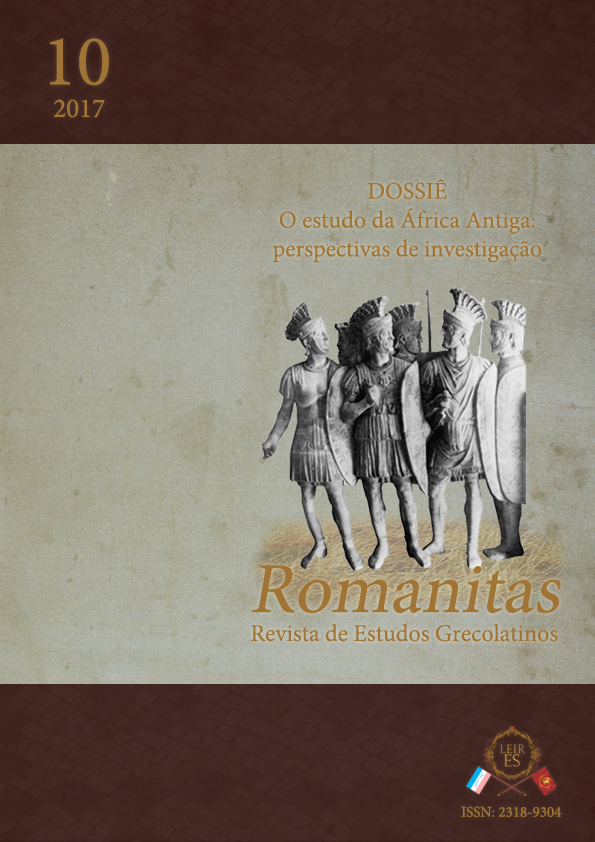Alexandria e Roma: representações, dinâmicas e vicissitudes na esfera do poder ptolomaico
DOI:
https://doi.org/10.17648/rom.v0i10.18972Palavras-chave:
Alexandria, Egito, Ptolomeus, Período helenísticoResumo
A expansão romana pelo Mediterrâneo Oriental foi um processo complexo, envolvendo diplomacia, alianças e conflitos com antigos reinos estabelecidos em uma região de enorme diversidade cultural e resultou na gradual absorção desses territórios sob o controle direto de Roma. O Egito ptolomaico foi o último grande reino helenístico conquistado e seu processo de anexação foi adiado em virtude de seu valor diferenciado para Roma, em vários aspectos. A literatura greco-romana pontua alguns momentos da vivência da dinastia ptolomaica, principalmente as ocasiões de contatos e tensões com Roma. A intenção desse artigo é avaliar como tais fontes representam a sucessão dos Ptolomeus, de forma a ressaltar o “caos” interno da dinastia, ao mesmo tempo em que justificariam a necessidade da instalação da “ordem” romana na região.Downloads
Referências
Documentação textual
APPIAN. Roman history. Translaled by Horace White. London: Harvard University Press, 1912.
ATHENAEUS. The learned banqueters. Edited and translated by Douglas Olson. London: Harvard University Press, 2007.
CAESAR. Alexandrian war. Translated by G. Way. London: Harvard University Press, 1955.
______. Civil wars. Edited and translated by Cynthia Damon. London: Harvard University Press, 1914.
CICERO. De domo sua. De haruspicum responsis. Edited and translated by G. Nisbet. Cambridge: Harvard University Press, 1979.
______. Letters to Atticus. Edited and translated by R. Shackleton Bailey. Cambridge: Harvard University Press, 1999.
______. Letters to friends. Edited and translated by R. Shackleton Bailey. Cambridge: Harvard University Press, 2001.
______. Letters to Quintus and Brutus. Edited and translated by R. Shackleton Bailey. Cambridge: Harvard University Press, 2002.
______. On the agrarian law. Translated by J. H. Freese. Cambridge: Harvard University Press, 1984.
______. Pro Caelio. Translated by R. Gardner. Cambridge: Harvard University Press, 1970.
______. Pro Rabirio Postumo. Translated by N. H. Watts. Cambridge: Harvard University Press, 1953.
DIO CASSIUS. Roman history. Translated by Earnest Cary and Herbert B. Foster. Cambridge: Harvard University Press, 1954.
DIODORUS SICULUS. Library of history. Translated by C. H. Oldfather. Cambridge: Harvard University Press, 1932.
FLORUS. Epitome of Roman history. Edward Seymour Forster. Cambridge: Harvard University Press, 1984.
FRONTINUS. Stratagem: aqueducts of Rome. Translated and edited by C. E. Bennett and Mary B. McElwain. London: Harvard University Press, 1925.
JOSEPHUS. Jewish Antiquities. Translated by J. Trackeray. Cambridge: Harvard University Press, 1930.
LIVY. History of Rome. Translated by Frank Gardner Moore. Cambridge: Harvard University Press, 1970.
LUCAN. Pharsalia. Translated by J. D. Duff. Cambridge: Harvard University Press, 1928.
PAUSANIAS. Description of Greece. Translated by W. H. S. Jones. Cambridge: Harvard University Press, 1918.
PLUTARCH. Lives. Translated by Bernadotte Perrin. Cambridge: Harvard University Press, 1914.
STRABO. Geography. Translated by Horace Leonard Jones. Cambridge: Harvard University Press, 1960.
SUETONIUS. Lives of the Caesars. Introdution by K. R. Bradley and translated by J. C. Rolfe. Cambridge: Harvard University Press, 1997.
Obras de Apoio
BERNAND, A. Alexandrie des ptolémées. Paris: CNRS Éditions, 2001.
BIEZUNSKA-MALOWIST, I. Formes de résistance dans l’Égypte grecque et romaine et l’attitude de gouvernement. In: YUGE, T.; DOI, M. (Ed.). Forms of control and subordination in Antiquity. Tokyo: The Society for Studies on Resistance Movements in Antiquity, 1988, p. 239-245.
BOWMAN, A. K. Egypt in the Graeco-Roman world: from Ptolemaic kingdom to Roman province. In: CRAWFORD, H. (Ed.). Regime change in the Ancient Near East and Egypt: from Sargon of Agade to Saddam Hussein. Oxford: Oxford University Press, 2007, p. 165-181.
CAPPONI, L. Augustan Egypt: the creation of a Roman province. London: Routledge, 1975.
CLÍMACO, J. C. A Alexandria dos antigos: entre a polêmica e o encantamento. Tese (Doutorado em História) – Programa de Pós-Graduação em História Social, Universidade de São Paulo, São Paulo, 2013.
EMPEREUR, J. Y. Alexandria rediscovered. London: Harcover, 1998.
GOLD, B. K. Literary patronage in Greece and Rome. North Chapel Hill: University of North Carolina Press, 1987.
GUARINELLO, N. L. História Antiga. São Paulo: Contexto, 2013.
HEKSTER, O. Kings and regime change in the Roman Republic. In: SMITH, C.; YARROW, L. M. (Ed.). Imperialism, cultural politics and Polybius. Oxford: Oxford University Press, 2012, p. 184-202.
HUZAR, E. Alexandria ad Aegyptum in the Julio-Claudian Age. Aufstieg und Niedergang der Römischen Welt, v. 2, n. 10.1, p. 619-668, 1988.
LEFÈVRE, F. História do mundo grego antigo. São Paulo: Martins Fontes, 2013.
LEWIS, N. Life in Egypt under Roman rule. Oxford: Oxford University Press, 1983.
MAEHLER, H. Alexandria, the mouseion and cultural identity. In: HIRST, A.; SILK, M. (Ed.). Alexandria, real and imagined. Aldershot: Ashgate, 2004, p. 1-14.
______. Roman poets of Egypt. In: MATTHEWS, R.; ROEMER, C. (Ed.). Ancient perspectives on Egypt. London: University of London Press, 2003, p. 203-215.
ROSTOVTZEFF, M. I. Social and economic history of the Hellenistic World. Oxford: Clarendon Press, 1941.
SCHULLARD, H. H. From the Gracchi to Nero: a history of Rome 133 B.C. to A.D. 68. New York: Routledge, 1982.
WILLIAMS, K. M. A. Alexandria and the sea: maritime origins and underwater explorations. London: Sharp Books, 2004.
Downloads
Publicado
Edição
Seção
Licença
Copyright (c) 2018 Romanitas - Revista de Estudos Grecolatinos

Este trabalho está licenciado sob uma licença Creative Commons Attribution-NonCommercial-NoDerivatives 4.0 International License.
a. Os autores mantêm os direitos autorais e concedem à revista o direito de primeira publicação.
b. Os autores têm autorização para assumir contratos adicionais separadamente, para distribuição não-exclusiva da versão do trabalho publicada nesta revista (ex.: publicar em repositório institucional ou como capítulo de livro), com reconhecimento de autoria e publicação inicial nesta revista.
c. Autores têm permissão e são estimulados a publicar e distribuir seu trabalho online (ex.: em repositórios institucionais ou na sua página pessoal) após a primeira publicação pela revista, com os devidos créditos.
d. Os textos da revista estão licenciados com uma Licença CC BY 4.0 Deed Atribuição 4.0 Internacional (CC BY).




























